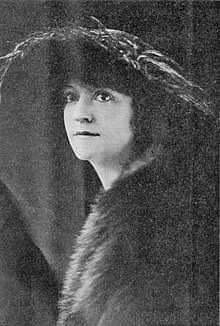Marie Nordstrom
Marie Nordstrom (born April 1887[1] in Fort Apache, Arizona) was an American actress.

Early years
Born in Fort Apache, Arizona,[2] Nordstrom was the daughter of United States Cavalry Captain Charles E. Nordstrom.[3] She was also the older sister of actress, novelist, and playwright Frances Nordstrom.[4] They moved with their mother to Washington, D.C., after their father's death.[5] She was educated at Georgetown Convent in the District of Columbia[6] and went on to study voice with Oscar Saenger.[3]
Nordstrom became interested in the theater when, at about age 12, she and her sister attended a play in San Antonio, Texas. Frances told a reporter in 1908, "... our youthful minds were entranced, whereupon we each resolved that when we grew to womanhood we were going to be actresses."[7] After they moved to Washington, both sisters attended more plays, which reinforced their interest in acting careers.[7]
Career
Nordstrom began her career in opera, appearing in productions that included La Tosca and Madame Butterfly, Henry E. Dixey, however, persuaded her to focus her efforts on acting rather than on singing.[3] In 1904, she became the leading lady in the company headed by Dixey.[8] Her introduction to Dixey came by accident when she accompanied her sister to an audition. Although the appointment had been made for Frances, Dixey was emphatic that Marie was the woman he wanted for the production of David Garrick.[4] In 1908, she joined the Chicago Opera House troupe as its leading lady.[9]
Nordstrom's Broadway credits include The Sap Runs High (1936), Mirrors (1928), Sweetheart Time (1926), Fashions of 1924 (1923), Lady Bug (1922), Bought and Paid For (1921), Girl o' Mine (1918), The Passing Show of 1917, The Charm of Isabel (1914), Bought and Paid For (1911), The Devil (1908), Papa Lebonnard (1908), The Man on the Box (1905), and Henry E. Dixey and Company (1904).[10]
Personal life
In May 1909, Nordstrom married Dixey in Milwaukee. The couple kept the wedding secret for a month, announcing it in New York in June 1909.[11] In 1925, she married Elliott Brown in New York City.[12] Brown manufactured marine machinery.[13]
References
- "United States Census, 1900". FamilySearch. Retrieved 14 January 2019.
- "Henry E. Dixey and Charming Wife Comfy and Cosy in Tiny Dressing Room". Star Tribune. Minnesota, Minneapolis. November 14, 1909. p. 11. Retrieved December 10, 2018 – via Newspapers.com.

- Anthony, Walter (August 24, 1913). "An 'At Home' With Marie Nordstrom, Mrs. Henry E. Dixey and Fanny". The San Francisco Call. California, San Francisco. p. 24. Retrieved December 7, 2018 – via Newspapers.com.

- "Grand Leading Woman Is Writing New Novel". Pittsburgh Daily Post. Pennsylvania, Pittsburgh. July 12, 1914. p. 18. Retrieved December 8, 2018 – via Newspapers.com.

- "Daughter of Soldier Is New Leading Woman". Pittsburgh Daily Post. Pennsylvania, Pittsburgh. July 5, 1914. p. Second Section - 2. Retrieved December 8, 2018 – via Newspapers.com.

- Savile, Hubert (July 1919). "Convent-Bred Thespians". Theatre Magazine. XXX (221): 34. Retrieved 7 December 2018.
- "How Two Sisters Took to Life on the Stage". The Pittsburgh Press. Pennsylvania, Pittsburgh. January 26, 1908. p. 34. Retrieved December 10, 2018 – via Newspapers.com.

- "Notes of the Stage". The Washington Post. D.C., Washington. August 28, 1904. p. 6. Retrieved December 7, 2018 – via Newspapers.com.

- "Around the Theaters". Chicago Tribune. Illinois, Chicago. September 30, 1908. p. 8. Retrieved December 7, 2018 – via Newspapers.com.

- "Marie Nordstrom". Internet Broadway Database. The Broadway League. Archived from the original on 8 December 2018. Retrieved 8 December 2018.
- "Miss Nordstrom Bride of Actor". The Washington Times. D.C., Washington. June 10, 1909. p. 8. Retrieved December 7, 2018 – via Newspapers.com.

- "Noted Pastor Officiates as Son and Actress Wed". Daily News. New York, New York City. June 2, 1925. p. 3. Retrieved December 10, 2018 – via Newspapers.com.

- "Marie Nordstrom to Wed Elliott Brown". Des Moines Tribune. Iowa, Des Moines. Associated Press. May 29, 1925. p. 1. Retrieved December 10, 2018 – via Newspapers.com.
